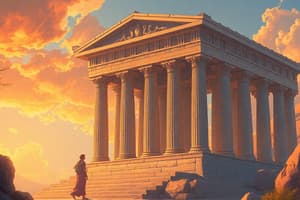Podcast
Questions and Answers
According to the teachings of the Master, what is the appropriate way to interact with someone who demonstrates negative qualities?
According to the teachings of the Master, what is the appropriate way to interact with someone who demonstrates negative qualities?
- To use their negative qualities as a reminder of one's own potential for improvement. (correct)
- To confront them directly and attempt to correct their behavior.
- To ignore their negative qualities and focus on their positive aspects.
- To separate oneself from them completely to avoid being influenced by their negative behavior.
Which of the following correctly describes the concept of "karma" as it relates to Buddhism?
Which of the following correctly describes the concept of "karma" as it relates to Buddhism?
- A system of rewards and punishments based on past actions.
- A spiritual force that guides individuals towards enlightenment.
- A predetermined destiny that cannot be changed through actions.
- A cyclical force that shapes future experiences based on current actions. (correct)
What is the significance of the concept of "dukkha" in Buddhist philosophy?
What is the significance of the concept of "dukkha" in Buddhist philosophy?
- It represents the ultimate goal of achieving enlightenment.
- It symbolizes the cycle of rebirth that continues until liberation is achieved.
- It is a fundamental truth that motivates the search for liberation.
- It describes the inherent suffering of all sentient beings. (correct)
Which of the following accurately describes the primary difference between Theravada and Mahayana Buddhism?
Which of the following accurately describes the primary difference between Theravada and Mahayana Buddhism?
How does the concept of the "Bodhisattva" differ from the idea of the "arhat" in Buddhist thought?
How does the concept of the "Bodhisattva" differ from the idea of the "arhat" in Buddhist thought?
Which of the following concepts emphasizes the importance of societal order and harmony through adherence to established rituals and social etiquette?
Which of the following concepts emphasizes the importance of societal order and harmony through adherence to established rituals and social etiquette?
What does the concept of 'self-transcendence' in Christianity suggest?
What does the concept of 'self-transcendence' in Christianity suggest?
What is the source of human unhappiness, as described by Livingston?
What is the source of human unhappiness, as described by Livingston?
Which of the following concepts aligns with the idea of a pantheistic worldview?
Which of the following concepts aligns with the idea of a pantheistic worldview?
Which of these concepts most directly addresses the problem of societal unrest and conflict, according to the text?
Which of these concepts most directly addresses the problem of societal unrest and conflict, according to the text?
Study Notes
Philosophers and Philosophies
- Plato believed that philosophers should be kings, and kings should be philosophers to end the troubles of states and humanity.
Stoicism
- Founder: Zeno (or Cilium)
- The universe is divine (Logos) and pantheistic
- Godness is living in accordance with Nature (Phusis)
- Happiness can be achieved through right reason coinciding with universal reason (Logos)
- Acceptance of both pain and pleasure, poverty and fortune, health and sickness with indifference (apathy)
Christianity
- Humans are made in the image of God (imago dei)
- A finite creature, not part of the divine
- Has a special place among creatures
- Self-transcendence: judging actions from beyond the self
- The Fall and original sin: traditional interpretation - Adam's guilt inherited by all; modern interpretation - born into a social matrix of sinful pride and egotism
- Livingston:We are self-transcendent and therefore are insatiable in our desires and never fully satisfied with those temporal aspirations that prove precarious, transient, and ultimately negligible. Because we are spiritual as well as biological creatures, we are problem to ourselves.
Confucianism
- Confucius (551-479 BCE) as "the First Teacher"
- "The way of the ancients" can be taught through education
- emphasize the embodiment of cultural behaviors and rituals.
-
The Master said: "Out walking with two companions, I'm sure to be in my teacher's company. The good in one I adopt in myself; the evil in the other I change in myself."Key concepts:
-
Li (禮) : ritual, "rules of social propriety" courtesy
-
Li creates an order and harmony in society
-
Jen (仁) : humaneness, benevolence
-
"how two people should treat one another"
-
The Analects emphasize the embodiment of cultural behaviors and rituals
-
Confucius' Wisdom
- At 15, set heart on learning; at 30, firmly took stand; at 40, no delusions; at 50, knew the mandate of Heaven; at 60, ear was attuned; at 70, followed heart's desire without overstepping boundaries of right
Birth of Buddhism
- Siddhartha Gautama (Syakamuni)
- Key concepts:
- "karma": "action" or "work" (and its effect/consequences)
- "samsara": "world"; the cycle of death and rebirth
- "dukkha": "suffering" or "unhappiness"
- "nirvana": "blown out"; liberation from samsara
Hindu Caste System
- Priest / Brahman
- Rulers, warriors / Ksyatriyas
- Farmers, merchants, artisans / Vaisyas
- Laborers, servants / Shudras
Buddhism Schools
- Theravada ("Way of Elders"): the Buddha as a teacher, seeks one's own salvation/enlightenment as an arhat
- Mahayana ("Great vehicle"): the Buddha as a savior, seeks everyone's salvation through the path of the Buddha/Bodhisattva
Studying That Suits You
Use AI to generate personalized quizzes and flashcards to suit your learning preferences.
Description
Explore the philosophy of Stoicism and the concept of Philosopher Kings, as discussed by Plato and Ram Dass. Learn about the principles of Stoicism, including the role of reason and nature in achieving happiness.




